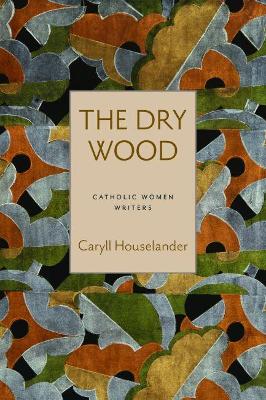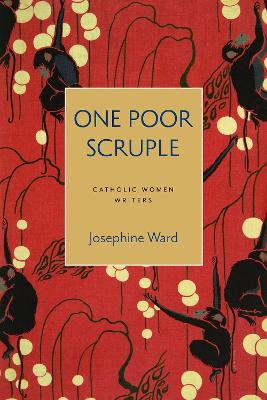Catholic Women Writers
2 total works
The Dry Wood
by Caryll Houselander, Bonnie Lander Johnson, and Julia Meszaros
Published 30 April 2022
In the English-speaking world, the Catholic Literary Revival is typically associated with the work of G. K. Chesterton/Hilaire Belloc, Evelyn Waugh and Graham Greene. But in fact the Revival's most numerous members were women. While some of these women remain well known?Muriel Spark, Antonia White, Flannery O'Connor, Dorothy Day?many have been almost entirely forgotten. They include: Enid Dinnis, Anna Hanson Dorsey, Alice Thomas Ellis, Eleanor Farjeon, Rumer Godden, Caroline Gordon, Clotilde Graves, Caryll Houselander, Sheila Kaye-Smith, Jane Lane, Marie Belloc Lowndes, Alice Meynell, Kathleen Raine, Pearl Mary Teresa Richards, Edith Sitwell, Gladys Bronwyn Stern, Josephine Ward, and Maisie Ward.
There are various reasons why each of these writers fell out of print: changes in the commercial publishing world after World War II, changes within the Church itself and in the English-speaking universities that redefined the literary canon in the last decades of the 20th century. Yet it remains puzzling that a body of writing so creative, so attuned to its historical moment, and so unique in its perspective on the human condition, should have fallen into obscurity for so long.
The Catholic Women Writers series brings together the English-language prose works of Catholic women from the 19th and 20th centuries; work that is of interest to a broad range of readers. Each volume is printed with an accessible but scholarly introduction by theologians and literary specialists.
The first volume in the series is Caryll Houselander's The Dry Wood. Houselander is known primarily for her spiritual writings but she also wrote one novel, set in a post-war London Docklands parish. There a motley group of lost souls are mourning the death of their saintly priest and hoping for the miraculous healing of a vulnerable child whose gentleness in the face of suffering brings conversion to them all in surprising and unexpected ways. The Dry Wood offers a vital contribution to the modern literary canon and a profound meditation on the purpose of human suffering.
There are various reasons why each of these writers fell out of print: changes in the commercial publishing world after World War II, changes within the Church itself and in the English-speaking universities that redefined the literary canon in the last decades of the 20th century. Yet it remains puzzling that a body of writing so creative, so attuned to its historical moment, and so unique in its perspective on the human condition, should have fallen into obscurity for so long.
The Catholic Women Writers series brings together the English-language prose works of Catholic women from the 19th and 20th centuries; work that is of interest to a broad range of readers. Each volume is printed with an accessible but scholarly introduction by theologians and literary specialists.
The first volume in the series is Caryll Houselander's The Dry Wood. Houselander is known primarily for her spiritual writings but she also wrote one novel, set in a post-war London Docklands parish. There a motley group of lost souls are mourning the death of their saintly priest and hoping for the miraculous healing of a vulnerable child whose gentleness in the face of suffering brings conversion to them all in surprising and unexpected ways. The Dry Wood offers a vital contribution to the modern literary canon and a profound meditation on the purpose of human suffering.
One Poor Scruple
by Josephine Ward, Julia Meszaros, and Bonnie Lander Johnson
Published 31 July 2023
The Catholic University of America Press is pleased to continue to present new volumes in our Catholic Women Writers series, which will shed new light on prose work of Catholic women writers from the 19th and 20th centuries.
Josephine Ward is one of Catholicism's greatest literary treasures and a foremost contributor to English literary history—except that she has all but completely fallen from the historical record. She spent her life in close companionship with the most active minds working in the late 19th century to restore to the Catholic Church in England the intellectual, sacramental and theological integrity it had once enjoyed before three hundred years of persecution. All seven of her novels are out of print, despite their once high acclaim in the fin de siècle literary world.
First published in 1899, One Poor Scruple follows the recusant Riversdale family who have survived the long penal years by observing a quiet aristocratic life of sport and agriculture, never stepping into the public sphere from which Catholics in Britain had been barred for so long. But at the start of the twentieth century, a new generation has emerged. The novel's younger characters are now legally able to go to Oxford and Cambridge and to enter the public life of letters. Emboldened by the confident work of John Henry Newman, this younger generation of Catholics are nonetheless cautioned not to trust the Protestant establishment. One Poor Scruple is a coming-of-age story in which the new generation of more worldly Catholics search for love, friendship and intellectual emancipation in the decadent social world of Edwardian London. Decades before Evelyn Waugh examined in Brideshead Revisitedthe human struggle to distinguish between true and false beauty, Ward's novel examined the challenge of discerning between conflicting desires and of living a life that is as truthful and good as it is beautiful.
Josephine Ward is one of Catholicism's greatest literary treasures and a foremost contributor to English literary history—except that she has all but completely fallen from the historical record. She spent her life in close companionship with the most active minds working in the late 19th century to restore to the Catholic Church in England the intellectual, sacramental and theological integrity it had once enjoyed before three hundred years of persecution. All seven of her novels are out of print, despite their once high acclaim in the fin de siècle literary world.
First published in 1899, One Poor Scruple follows the recusant Riversdale family who have survived the long penal years by observing a quiet aristocratic life of sport and agriculture, never stepping into the public sphere from which Catholics in Britain had been barred for so long. But at the start of the twentieth century, a new generation has emerged. The novel's younger characters are now legally able to go to Oxford and Cambridge and to enter the public life of letters. Emboldened by the confident work of John Henry Newman, this younger generation of Catholics are nonetheless cautioned not to trust the Protestant establishment. One Poor Scruple is a coming-of-age story in which the new generation of more worldly Catholics search for love, friendship and intellectual emancipation in the decadent social world of Edwardian London. Decades before Evelyn Waugh examined in Brideshead Revisitedthe human struggle to distinguish between true and false beauty, Ward's novel examined the challenge of discerning between conflicting desires and of living a life that is as truthful and good as it is beautiful.

